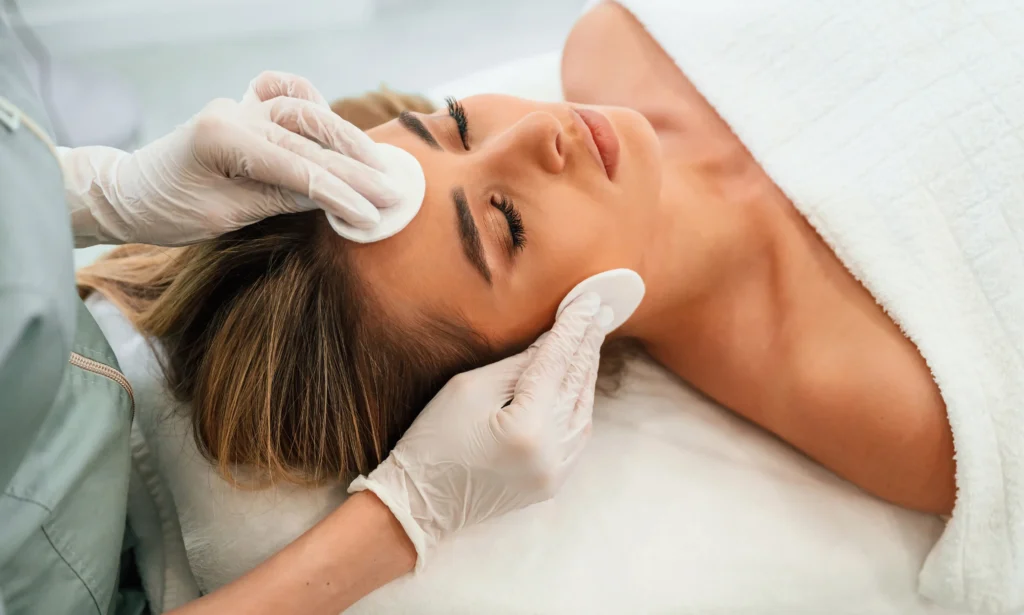
Some lucky folks have skin that defies time and the elements, but most of us aren’t so fortunate. Aging strips skin of elasticity, bringing wrinkles and fine lines, while sun, pollution, and stress pile on damage. Want to reclaim smooth, spot-free skin? A chemical peel Denver might be your answer. With various types and strengths, this guide explains how chemical peels work and why they’re a game-changer for skin health.
What Is a Chemical Peel Denver and Its Purpose?
A chemical peel uses acids—like salicylic, lactic, glycolic, trichloroacetic (TCA), or phenol—to exfoliate damaged skin, revealing a fresher layer beneath. It “forces” healing, boosting collagen and cell turnover for a brighter, smoother complexion. Here’s why it’s effective:
Better Skin Tone
Peels lighten dark patches, acne scars, and uneven tones by shedding the top layer, typically leaving skin one shade brighter.
Smoother Skin Texture
UV rays and pollution roughen skin, but peels stimulate collagen to tighten pores and minimize fine lines, often with extras like retinol or vitamin C.
Acne Treatment
With antibacterial and anti-inflammatory powers, peels reduce mild to moderate acne and fade scars by renewing skin cells.
Boosted Collagen Production
Collagen—key to firmness—drops with age. Peels kickstart its production, fighting wrinkles and sagging for youthful skin.

How Does a Chemical Peel Denver Work?
The process isn’t a spa-day breeze, but it’s manageable. Here’s what to expect:
The Procedure
A specialist applies the peel for 3-10 minutes, then neutralizes it with water or a solution. It takes about 30 minutes total. Light peels (e.g., AHAs) tingle mildly, while stronger ones (e.g., TCA) may burn briefly—fans, ice, or numbing cream help. Post-peel masks often soothe the skin.
Pain and Downtime
Superficial and medium peels sting temporarily with little downtime—redness fades in hours. Deep peels, though rare, are more intense and require longer recovery. Follow your pro’s aftercare to ease discomfort and optimize results.
Types of Chemical Peels in Denver
Peels vary by depth and purpose. Choose based on your skin’s needs:
Light Peels
Using AHAs like glycolic or salicylic acid, these target the surface and upper dermis. Ideal for mild pigmentation or a refresh, they’re gentle with minimal downtime. Multiple sessions may tackle acne or sun damage.
Medium Peels
TCA powers these peels to reach the mid-epidermis, treating moderate wrinkles, pigmentation, and sun damage. Expect redness or crusting for up to a week.
Deep Peels
Phenol or high-strength TCA dives into the lower dermis for severe wrinkles, scars, or damage. Done by pros only, recovery stretches longer—consultation is a must.
Aftercare for Chemical Peels in Denver
Peels expose fragile new skin, so aftercare is critical:
Key Tips
- Avoid sun for 2 weeks—new skin burns easily.
- Don’t pick scabs to prevent scarring.
- Use gentle moisturizer to hydrate.
- Skip lasers or hair removal for 2 weeks.
- Avoid harsh products or scrubs.
- Follow your dermatologist’s routine.
Cautions for Dark Skin
Peels can lighten melanin-rich skin, risking uneven tones or patches. Lower-strength options reduce this risk—consult a pro experienced with darker skin tones.
Why Choose Eden Health Club for Chemical Peels Denver?
Eden Health Club offers top-tier chemical peels in Denver tailored to your needs:
Targeting Brown Spots
Their peels excel at fading hyperpigmentation and brown spots, paired with options like microneedling or laser resurfacing for total skin renewal.
Holistic Approach
Beyond peels, Eden’s Corner for Healthy Skin blends diet advice and fitness plans, ensuring glowing results from inside and out.
Why Chemical Peels Denver Are Worth It
Chemical peels in Denver tackle aging, acne, and damage with proven results—smoother texture, even tone, and boosted collagen. From light refreshes to deep repairs, they adapt to your skin. Eden Health Club elevates the experience with expert care and wellness support.
Ready for radiant skin? Contact Eden Health Club today for your chemical peel Denver consultation!
